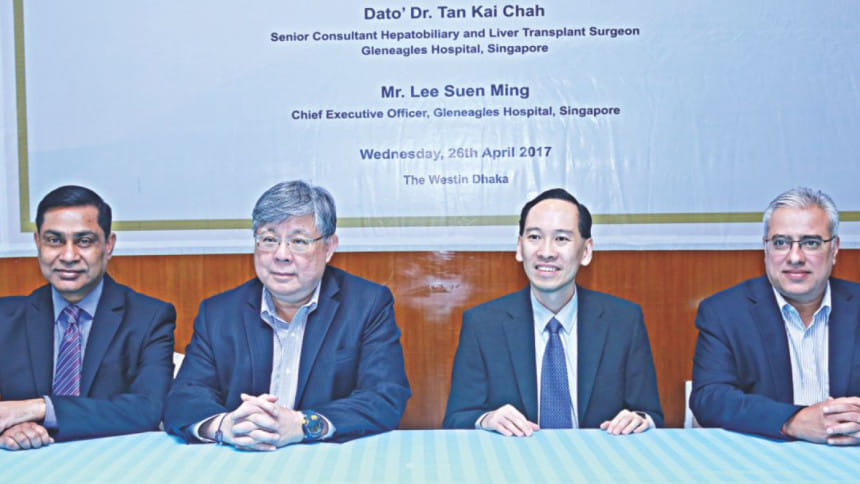Gleneagles Hospital expands services to grab Asian market

Gleneagles Hospital, a leading healthcare provider in the Asian region, is expanding its footprint gradually riding on its world-class facilities.
“We are growing well. We are not that big. But we believe more in quality than in the number of beds. We are capable of providing the best care to patients,” said Lee Suen Ming, chief executive officer of the hospital in Singapore.
Gleneagles Hospital provides a wide range of specialist, diagnostic and imaging services. The 258-bed hospital houses an extensive range of medical and surgical specialties including oncology, cardiology, liver transplant, gastroenterology, orthopaedic surgery and sports medicine, and obstetrics and gynaecology.
Since 2006, the hospital has been accredited by the Joint Commission International (JCI), an internationally recognised standard for patient and staff safety.
The hospital is part of Parkway Pantai, the largest private healthcare provider in Singapore. Parkway Pantai also operates Mount Elizabeth Novena Hospital, Mount Elizabeth Hospital, and Parkway East Hospital in Singapore -- all accredited by the JCI.
Ming said Gleneagles Hospital prides itself for touching peoples' lives through operations and services.
“When patients come to the hospital, we want them to feel warm, very assured and comfortable. For us, that touch is very important. So, we focus a lot on training our people to deliver excellent services to our patients. That is our unique proposition to our patients.”
Talking about the hospital's expansion plan, the CEO said the hospital now has four VIP suites which would go up to six.
“This is simply because its business is growing and there is a lot of demand,” he told The Daily Star in an interview recently.
The occupancy rate is 70 percent with locals making up 70-80 percent while the rest is foreigners, mainly from Indonesia.
Ming said the hospital also receives a good number of patients from Bangladesh.
The hospital has over 300 active doctors and more than 1,000 accredited doctors. The majority are from Singapore.
Ming along with Tan Kai Chah, who heads the liver transplant programme at Gleneagles Hospital, visited Apollo Hospitals and United Hospital in Dhaka recently.
“Both are very good and maintain high level of standards,” said Ming.
Ming said Gleneagles Hospital is looking at potential collaboration with hospitals across borders.
“I met the senior executives of both hospitals and I told them 'let's grow together, collaborate and work together so that we learn from each other'.”
“We want to build trust and confidence. To me, the objective of both of the hospitals is aligned as they want the best for their patients. ”
Gleneagles Hospital has certain strength in nursing care and intensive care unit and hospital management which it can share with the hospitals in order to help them improve their services and processes.
“They are also very keen. I am happy for that,” said Ming.
Chah said Bangladeshis visit the hospital for taking treatment in complicated cases and big operations related to liver transplant, cardiac, orthopaedic and neurosurgery.
“Patients also visit the hospital for other cases. This is mainly because our services are quite different compared to other hospitals in the region.”
Chah performed the first living donor liver transplant in Singapore in 1996, and one of the leading experts of liver transplant in the region. He and his team have performed more than 200 liver transplant procedures.
Chah said patients should take note that the living donor liver transplant programme in Singapore is subject to approval from the health ministry to safeguard against human organ commerce.
“Liver transplant is very strict in Singapore. In a way, it is good for the patients because the health ministry wants to make sure the patients deserve the transplant and there is no other option left.”
“The ministry will also see whether the patients have good chance of survival after the operation,” he said, adding that there are countries in the region where one can go and have their liver transplanted without much supervisory from the authorities.
The ministry also makes sure that the donor understands the risk as well, Chah said.
He said many people come to Singapore to avail treatment for themselves or for their family members because to them cost is not an issue.
“Everything we do is first-class. Many of our physicians and nurses have been trained in the US. So, it is different category altogether.”
The US-based University of Pittsburgh Medical Centre, a pioneer in liver transplant, is the medical partner of the Gleneagles Hospital.
The Gleneagles Hospital carries out transplant for all the military and police personnel and their relatives in Singapore. It has also signed an agreement with the military of the UAE.
The hospital performs 25 liver transplants in a year on an average. “We agree that the cost is still is very, very important, and we are looking into the issue,” said Chah, adding that the hospital has also carried out liver transplants on some Bangladeshis.
Ming said the hospital is not in any competition with any hospital in the region. “We always believe in collaboration. It is misperception that hospitals in the region are stealing patients from each other. What is best for the patients is in our common interest. Health is not a one-off transaction.”
Parkway Pantai has two patient assistance centres in Dhaka and Chittagong.

 For all latest news, follow The Daily Star's Google News channel.
For all latest news, follow The Daily Star's Google News channel. 



Comments